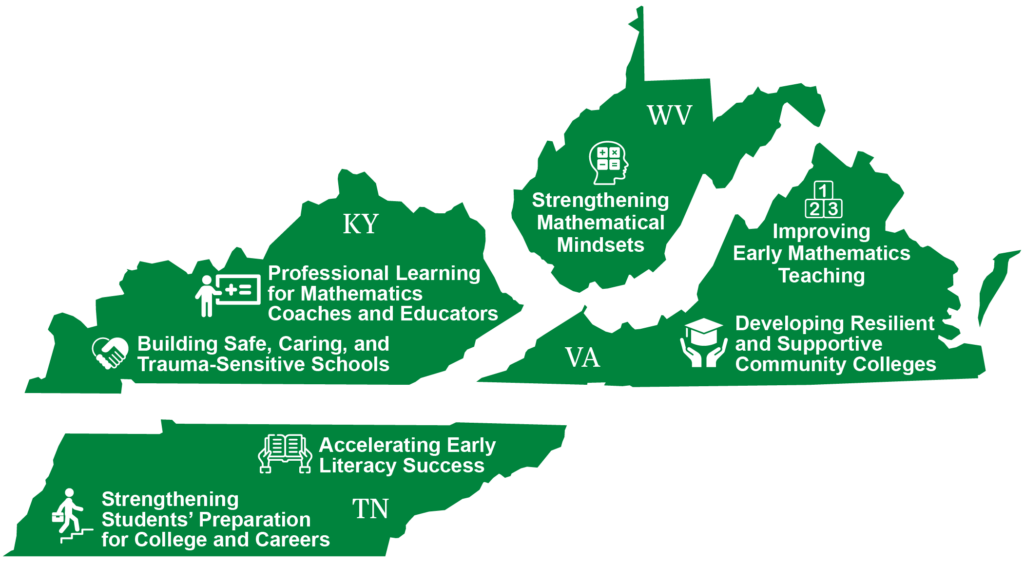
SRI’s REL Appalachia partners with schools and districts to ensure that families and teachers have the resources and knowledge they need to support students.
Ensuring access to a solid education can set students up for success in life, improving basic skills, such as mathematics and literacy, and more complex skills, such as critical thinking, problem-solving, and resiliency in the face of challenging circumstances.
At the Regional Education Laboratory (REL) Appalachia, a lab run by SRI International’s Education Division, researchers and technical assistance providers are providing evidence-based support to improve education in Kentucky, Tennessee, Virginia, and West Virginia, and help provide educational resources and services that students need to succeed in school and in life.

The lab provides a vital resource to the region, partnering directly with schools, districts, state agencies, and education nonprofits to help address their most pressing problems. In partnership with K-12 educators in rural Kentucky and community college leaders in Virginia, REL Appalachia’s experts are helping leaders identify and implement trauma-sensitive practices to ensure safe and supportive learning environments for students and faculty.
In Tennessee, the lab supports educators in their efforts to examine the benefits of a literacy tutoring program and helps strengthen high school graduates’ preparation for their experiences after high school—including additional education and training, careers, and the military. In Virginia, the lab is creating a professional development toolkit to strengthen mathematics instructional practices for early learners, and in West Virginia, REL Appalachia is partnering with local educators to improve mathematics teaching and learning in schools and with community partners.
The lab also has partnerships that stretch beyond school walls, helping educators support grandparents and other kinship caregivers and supporting local implementation of a toolkit for Community Math Nights, which incorporate the whole family in a child’s math learning.
“Our focus is on helping schools and districts find practices that are supported by research and use them in the classroom to improve learning for students,” said Victoria Schaefer, director of SRI’s Center for Education Research and Innovation and of REL Appalachia. “To help communities meet the diverse needs of each student, we weave research, technical assistance, and dissemination together into a cohesive set of resources that creates new information that people can use and apply to their work; supports policymakers, program leaders, and educators to teach better; and shares this information with others.”
For more than 50 years, experts at SRI Education have led research and evaluation projects across a host of critically important content areas and engaged education leaders in improvement efforts at all levels of the education system. They have the knowledge and experience to work alongside educators in the field to help address pressing problems of practice and ensure that educational equity is embedded throughout their projects.
“Our staff know their region and its people, the evidenced-backed solutions to pressing problems, and the best approaches for meeting partners where they are so that, together, SRI and our partners can improve teaching, learning, and lives,” Schaefer said.
Finding patterns in the data
In 2020, REL Appalachia completed a study designed to help state and local leaders understand whether statewide policies that encouraged students to complete Algebra 1 in middle school instead of ninth grade were working as intended. The policies were intended to improve school outcomes and better prepare students for college and careers, but districts weren’t sure whether they were doing everything right to set each student up for success. In collaboration with local school districts, researchers at REL Appalachia dove into previous years’ data, examining outcomes and looking for patterns.
They found that taking Algebra 1 early didn’t necessarily encourage learners to take higher-level math courses in high school, as some students simply stopped after finishing the required courses. They also found that a smaller percentage of students receiving services for economic disadvantages and to strengthen their English-language skills received a recommendation to take accelerated math courses, even if they had scored well on earlier assessments.
“This whole strand of equity started coming up,” said Laura Kassner, senior education researcher at SRI and dissemination lead for REL Appalachia. “Who are we steering in and out of these courses at what times? What does this mean for our school counseling services? What does this mean for parent education? What does equitable math instruction look like?”
Over several years, math leaders in these school districts worked with REL Appalachia researchers to share these results through infographics and seminars and use them to guide professional development. REL Appalachia provided the tools to help schools continue to collect and examine their own data and to ensure that their practices were working for all students, even after the formal collaboration had concluded.
“When our partners come to us with a problem of practice, we bring our capacity to bolster theirs,” Kassner said. “If together we can solve or make headway toward solving a problem that’s really challenging and leave the tools that an educator, policymaker, or program leader needs to continue to strengthen their program and practices, that’s when we’ve done our best work.”
REL Appalachia is one of 10 labs in the Regional Education Laboratory program, which has existed for almost 60 years and represents the largest federal research investment in state and local schools. All the lab’s work is funded by the Institute of Education Science and provided free to state and local partners. Researchers at REL Appalachia constantly collaborate with partners in the region to collect, create, and implement evidence-based solutions. They are dedicated to finding and conducting the research needed to support students and teachers and to improve education outcomes in the immediate future.
“You get one chance at a child’s educational career, and you want to get it right,” Kassner said. “We’re not satisfied with the idea of just trying and seeing what works—it’s not how we want any child treated. The idea is to give every kid their best shot by bringing evidence to bear, and that’s incredibly motivating for all of us in this work.”
This story was written by SRI and does not necessarily represent the views of the federal government or the REL program.



